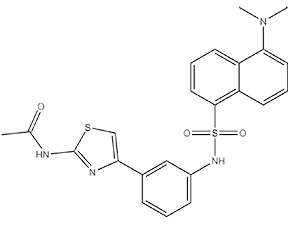
HA15
CAS No. 1609402-14-3
HA15( HA15 | HA-15 | HA 15 )
Catalog No. M17340 CAS No. 1609402-14-3
HA15 targets specifically BiP/GRP78/HSPA5. HA15 exhibits anti-cancerous activity on all melanoma cells tested, including cells isolated from patients and cells that developed resistance to BRAF inhibitors.
Purity : >98% (HPLC)
 COA
COA
 Datasheet
Datasheet
 HNMR
HNMR
 HPLC
HPLC
 MSDS
MSDS
 Handing Instructions
Handing Instructions
| Size | Price / USD | Stock | Quantity |
| 2MG | 42 | In Stock |


|
| 5MG | 68 | In Stock |


|
| 10MG | 87 | In Stock |


|
| 25MG | 177 | In Stock |


|
| 50MG | 312 | In Stock |


|
| 100MG | 537 | In Stock |


|
| 200MG | Get Quote | In Stock |


|
| 500MG | Get Quote | In Stock |


|
| 1G | Get Quote | In Stock |


|
Biological Information
-
Product NameHA15
-
NoteResearch use only, not for human use.
-
Brief DescriptionHA15 targets specifically BiP/GRP78/HSPA5. HA15 exhibits anti-cancerous activity on all melanoma cells tested, including cells isolated from patients and cells that developed resistance to BRAF inhibitors.
-
DescriptionHA15 targets specifically BiP/GRP78/HSPA5. HA15 exhibits anti-cancerous activity on all melanoma cells tested, including cells isolated from patients and cells that developed resistance to BRAF inhibitors.
-
In VitroHA15 (10 μM; 1-24 hours) induces an early endoplasmic reticulum stress (ER Stress).HA15 (0-10μM; 24 hours) decreases melanoma cell viability in a dose-dependent manner compared with control conditions (DMSO), with an IC50 of 1-2.5 μM in? A375 cells.HA15 (1-10 μM; 24 hours) induces apoptosis in A375 cells.HA15 (1-24 μM; 24 hours) induces autophagy.HA15 (10 μM; 48 hours) has high efficiency in inducing cell death and ER stress in BRAF-inhibitor-resistant melanoma cells. And HA15 inhibits tumor growth through autophagic and apoptotic mechanisms initiated by ER stress.No deleterious effects on the viability of normal human melanocytes or human fibroblasts were observed with low or high doses of HA15. Cell Viability Assay Cell Line:A375 cells Concentration:1 μM,2.5 μM,5 μM,7.5 μM,10 μM Incubation Time:24 hours Result:Decreased melanoma cell viability in a dose-dependent manner compared with control conditions (DMSO) in A375 cells.Apoptosis Analysis Cell Line:A375 cells Concentration:1 μM, 5 μM, 10 μM Incubation Time:24 hours Result:Induces apoptosis.Cell Autophagy Assay Cell Line:A375 cells Concentration:1 μM, 4 μM, 10 μM, 24 μMIncubation Time:24 hours Result:Increased LC3B-II expression after 1 hour and persisted after 24 hours, enhanced the expression level of Beclin 1, clearly be indicated that induces autophagy.Western Blot Analysis Cell Line:A375 cells Concentration:10 μM Incubation Time:1 hour, 4 hours, 10 hours, 24 hours Result:Exhibited a rapid induction within 1 hour of the ER stress markers (phosphorylation of PERK and elF2α and a weak increase in ATF4 and CHOP expression)
-
In VivoHA15 (0.7 mg/mouse/day; i.h.; over 2 weeks) inhibits melanoma tumor development in mice, induces no apparent toxicity and no change in their behavior, body mass, or liver mass, suggesting an absence of hepatomegaly. HA15 (0.7 mg/mouse; i.p.; 5 days/week) suppresses MPM tumor growth in vivo. Animal Model:6-weeks female BALB/c nu/nu (nude) mice with A375 melanoma cells xenograft Dosage:0.7 mg/mouse/day dministration: Subcutaneous injection; over a period of 2 weeks Result:Attenuated the development of tumors.Animal Model:Mouse, NSG (NOD-scid IL2Rγnull) Dosage:0.7 mg/mouse Administration:Intraperitoneal injection, 5 days/week, for 5 weeks Result:Suppressed MPM tumor growth.
-
SynonymsHA15 | HA-15 | HA 15
-
PathwayOthers
-
TargetOther Targets
-
RecptorGRP78| HSPA5| BiP
-
Research AreaCancer
-
Indication——
Chemical Information
-
CAS Number1609402-14-3
-
Formula Weight466.58
-
Molecular FormulaC23H22N4O3S2
-
Purity>98% (HPLC)
-
SolubilityDMSO : ≥ 50 mg/mL. 107.16 mM; H2O : < 0.1 mg/mL
-
SMILESCC(=O)Nc1nc(c2cccc(NS(=O)(=O)c3c4cccc(N(C)C)c4ccc3)c2)cs1
-
Chemical NameN-(4-(3-((5-(dimethylamino)naphthalene)-1-sulfonamido)phenyl)thiazol-2-yl)acetamide
Shipping & Storage Information
-
Storage(-20℃)
-
ShippingWith Ice Pack
-
Stability≥ 2 years
Reference
1.Cerezo M et al. Cancer Cell. 2016 Jun 13;29(6):805-19.
molnova catalog



related products
-
(Arg)9 TFA
(Arg)9 TFA (Nona-L-arginine TFA), a cell-penetrating peptide, exhibits neuroprotective activity with an IC50 of 0.78 μM in the glutamic acid model.Poly-arginine (e.g. (Arg)9) and arginine-rich peptides (e.g. TAT, penetratin), which belong to a class of peptides with cell-penetrating properties are neuroprotective.
-
Purine
Purine is a heterocyclic aromatic organic compound consisting of a pyrimidine ring fused to an imidazole ring.
-
1-Methyl-2-(Methylth...
1-Methyl-2-(methylthio)imidazole is an impurity of Methimazole, a thiourea antithyroid agent that prevents iodine organification, thus inhibiting the synthesis of thyroxine.



 Cart
Cart
 sales@molnova.com
sales@molnova.com


